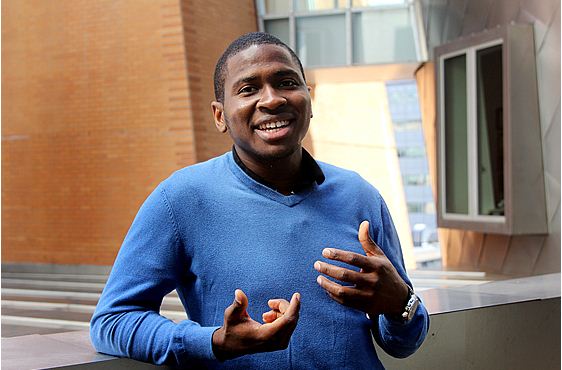University of Nigeria Graduate Makes Groundbreaking Inventions at MIT
Like many Nigerians, MIT graduate student Chidube Ezeozue grew up frustrated by his nation’s erratic electrical grid.
“Electrical outages are a huge problem in Nigeria,” says Ezeozue, who is pursuing dual master’s degrees in MIT’s Technology and Policy Program and in electrical engineering and computer science. “The outages really interrupt everyday life.”
Nigeria’s supply of electricity is severely limited, resulting in rolling outages: Power is cut off every few hours and redirected to neighborhoods that were previously in the dark. While Nigerians know to expect these power cuts, they rarely know when the outages will happen, or how long they will last.
Since coming to MIT in 2011, Ezeozue — who received his undergraduate degree in electrical engineering from the University of Nigeria in 2008, followed by three years of work at a software startup — has created an app, with his brother, that crowdsources information about Nigerian power outages. With the app, called NepaSituation, people living in Nigeria can report outages. This data, when merged into an algorithm developed by Ezeozue, can help Nigerians predict when power outages may strike their neighborhoods, and how long those outages might last.
“With over 100 million cell phones in Nigeria, we knew it was an important resource we could tap into,” Ezeozue says. “It took a while to come up with this algorithm, because the outages are pretty randomized, and the app is only as good as the number of people who enter outage data.”
But Ezeozue has delved into more than just tracking the problem: He is also working to address Nigeria’s chronic energy shortage.
“I started a company that is working to provide solar electricity to businesses and families at zero upfront cost,” Ezeozue says. The company, SolarKobo, was recently funded by a seed grant from MIT’s Legatum Center for Development and Entrepreneurship, where Ezeozue is a fellow.
“Nigeria has plenty of solar energy available … for as low as $25 a month, we can make this resource available to those who are interested,” Ezeozue adds.
When he is not working toward the betterment of his homeland, Ezeozue researches machine learning and prediction algorithms in the research group of Una-May O’Reilly, a principal research scientist in MIT’s Computer Science and Artificial Intelligence Laboratory.
“We are trying to use medical data, such as blood-pressure levels, to improve patient care,” Ezeozue says. “We observe states that patients’ [blood] pressure goes through and eventually we can predict what state they will go to. These predictions help doctors determine what to expect next.”
Ezeozue is also passionate about education. Along with other Nigerian students at MIT, Ezeozue has started two initiatives to encourage students in Nigeria to pursue higher education outside the country.
In one of these initiatives, which is aimed at high school students, Ezeozue and Chika Ugboh, an MIT chemical engineering student, bought preparatory materials and paid for a few students in one Nigerian school to take the SAT. While this pilot, which was launched in 2011, was not an unequivocal success, Ezeozue says, “We learned that simply providing the materials isn’t enough — it has to be accompanied by mentoring and training.” He and Ugboh are now working to assess how these Nigerian students learn best.
The second of these initiatives is aimed at Nigerian undergraduates: Working through their own networks in Nigeria, Ezeozue and other MIT graduate students are encouraging Nigerian undergraduates who might be interested in postgraduate study abroad.
“The goal is to build a generation of highly educated Nigerians who will hopefully go back to build a better Nigeria,” Ezeozue says. “I plan to eventually go back to Nigeria.”
For now, after graduating from MIT in June, Ezeozue will remain in Cambridge, working as a software engineer for Google.
Source: MIT News


I was at unn recently and found the den looking good as a good academic envt. We hope to have more inventors in the near future that will solve our national problems so we can reduce our dependence on foreign economies.
Inspiring. This a nice way of serving ones homeland
This youngmans ingenuity lends credence to the fact that technology is not a closed shop and has nothing to do with skin colour
I love the development! Nigerians should emulate such feat in education.